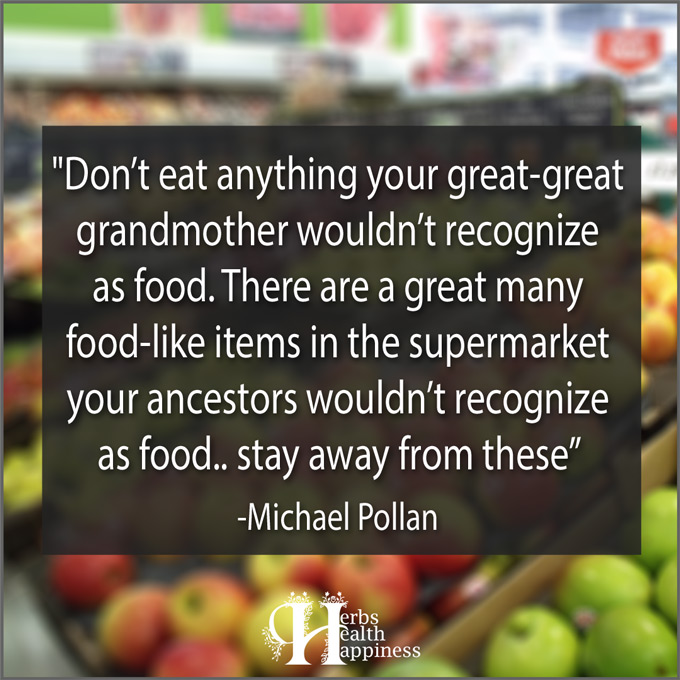
graphic © herbshealthhappiness.com (with permission)
“Don’t eat anything your great-great grandmother wouldn’t recognize as food. There are a great many food-like items in the supermarket your ancestors wouldn’t recognize as food.. stay away from these.” – Michael Pollan
Michael Pollan is a journalist, activist, and probably best known for being the author of the book “The Omnivore’s Dilemma,” named as one of the ten best books of 2006 by the New York Times and the Washington Post. He received an M.A. in English from Columbia University, and has worked as a professor of journalism. He has also written for the New York Times magazine. He has received several awards in journalism including the James Beard Award for the Best Magazine Series in 2003 and the Reuters I.U.C.N. 2000 Global Award for Environmental Journalism.
Pollan is a harsh critic of U.S. food policies. He contends that Americans are obsessed with healthy eating yet invented a Western diet that consists of “unrecognizable” food. He finds it ironic that even though French people consume a lot of cheese, wine and foie gras, they have better heart health than most Americans. He calls the Western diet as the worst in the world.
The quote by Pollan highlights the importance of eating whole, natural foods. The message is to steer clear of processed, artificial foods that have been heavily altered from their original form. By doing so, we can improve our health, reduce our risk of chronic diseases, and nourish our bodies with the nutrients they need.
One of the key points that Pollan makes in this quote is that our ancestors would not have recognized many of the foods that we consume today as actual food. This is because many of these foods are manufactured “food like products” rather than grown “real food” – and often contain a host of artificial ingredients and preservatives. These foods are often high in added sugars, sodium, and unhealthy fats, and lack the nutrients that our bodies need to function properly.
Pollan’s battle cry is “Eat real food.” With today’s craze on new food products, or as he calls them “edible food-like substances” or “food-like products”, people are at risk of consuming ingredients that aren’t supposed to be consumed. In his books, he reiterates the importance of checking the label before purchasing, eating organic, and leaving the table a little hungry.
Inevitably, criticisms were thrown at him by big companies and even the American government. As Pollan says, “But that’s the challenge – to change the system more than it changes you.”

In conclusion, this quote is a powerful reminder to take a step back and consider the food choices we make on a daily basis. By eating whole, natural foods, we can improve our health, reduce our risk of chronic diseases, and nourish our bodies with the nutrients they need.
Here is a list of books authored by Michael Pollan, together with their publication date.
The Omnivore’s Dilemma: A Natural History of Four Meals” (2006)
“In Defense of Food: An Eater’s Manifesto” (2008)
“Food Rules: An Eater’s Manual” (2009)
“The Botany of Desire: A Plant’s-Eye View of the World” (2001)
“Cooked: A Natural History of Transformation” (2013)
“How to Change Your Mind: What the New Science of Psychedelics Teaches Us About Consciousness, Dying, Addiction, Depression, and Transcendence” (2018)
“The Third Plate: Field Notes on the Future of Food” (2014)
Here are five further quotations from Michael Pollan:
“The human animal has evolved to find sweetness irresistible; it’s a signal that the food in question is safe to eat and rich in the kinds of energy our bodies need.”
“The single greatest lesson the garden teaches is that our relationship to the planet need not be zero-sum, and that as long as the sun still shines and people still can plan and plant, think and do, we can, if we bother to try, find ways to provide for ourselves without diminishing the world.”
“We need to relearn the art of cooking and of eating, which is really the same thing.”
“The human body is a machine that is designed to move, and the more it moves, the better it works.”
“The more we know about the workings of the natural world, the more we can appreciate the miracle of life and the beauty of the universe.”
😳 What Tinnitus Does To Your Brain Cells (And How To Stop It)
After 47 years of studies and countless brain scans done on more than 2,400 tinnitus patients, scientists at the MIT Institute found that in a shocking 96% of cases, tinnitus was actually shrinking their brain cells.
As it turns out, tinnitus and brain health are strongly linked.
Even more interesting: The reason why top army officials are not deaf after decades of hearing machine guns, bombs going off and helicopter noises…
Is because they are using something called "the wire method", a simple protocol inspired by a classified surgery on deaf people from the 1950s...
★ How To Get Rid Of Nail Fungus:
★ Does Your Salad Contain This Vegetable?
★ Top 10 Most Valuable Medicinal Herbs:





